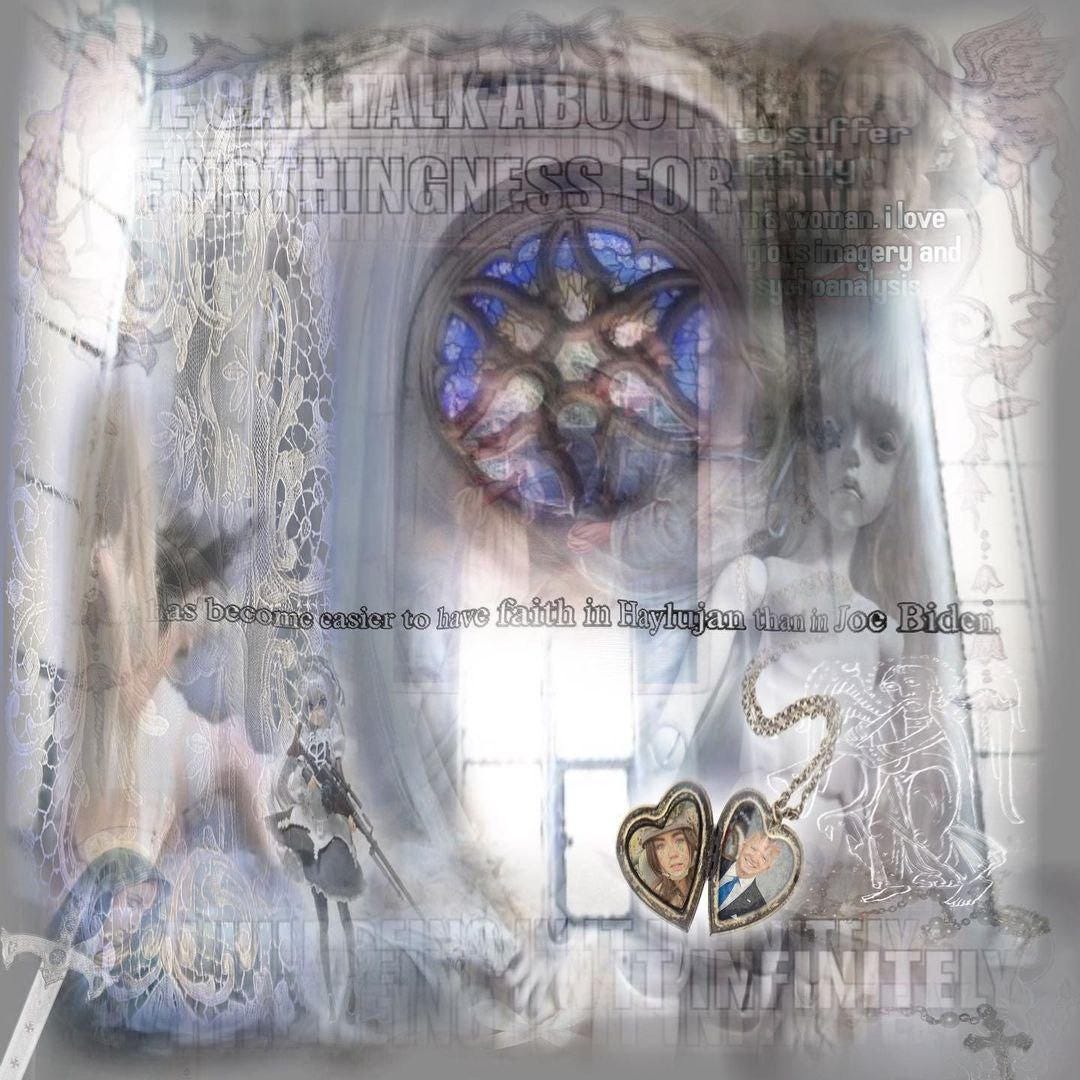Text: Xleepyfay
Illustrations: Aemmonia
The Xenofeminist Hauntology
How fandom and reactionary roleplay are taking over what political identity once was. May it be the rise of military Waifuism, trad-cath communities praying Hail Mary on the internet, or anemic sugar dolls wearing a light pink lace shirt saying ‘Is it me you’re looking for?’ – Questionable fandom and post-identity Roleplays alluding to utterly reactionary views are taking over the originally progressive corners of the internet at a fast pace. What social segment is this trend emerging from and where is it to be politically located, if at all?
There has been a notable growth and fragmentation of post-identity roleplay distilled in mainly online character builds appearing as anonymous instagram accounts, TikTok LARPs, or as conservative representatives on 4chan. These roleplays impersonate and hyper-aesthetisize a variety of different reactionary and often highly incoherent views in the realm of militarism, religion, gender & sexuality, or technology. Whilst the cycled trending and revival of past ideologies is not necessarily a new phenomena, what is, instead, is that these adapted reactionary personas are often lived by initially progressively thinking, often academic leftist communities. It seems that this social segment, accelerated by the internet, is shifting towards a post-moral dystopian LARP, as a response to the political fever dream of neo-liberalism and its alleged gospel truth. On a global level, the past half decade has proven more than ever before, that you will have your progressive hopes broken in disillusion no matter what actuality based political movement you put your faith in, hence allegations like ‘’It has become easier to trust Haylujan rather than Joe Biden’’ gain validity on myriads of levels. Trending intersectional approaches, even the most progress alluding identity politics will misfire in poptimistic symbolism and most likely stagnate in reductionist representation policies.
The apolitical stasis emerging out of the xenofeminist ethos
Xenofeminism, as a form of Left-Accelerationism, rejects these currently trending safety-pin politics. It is a critique to the “privilege”-based identity politics, that are largely fed to the moderate left as an easily acknowledgeable and undoubtedly sacred concept. Xenofeminism states that traditional means of Left praxis are ineffectual against the ascendant superstructure we live under. It is a demand to resituate Left “critical theory”-based politics into a consequential and technological framework. This demand, however, is not pursued into theory and neither into political aspiration. Instead, the online xenofeminist ethos leaves politics as a whole behind and distills itself into hyper-aesthetisized post-identity roleplay. It is a movement that steps out of the political sphere at the momentum of the xenofeminist disillusion, in order to substitute what political identity once was with something that equals post-moral performativity. It suggests a reawakening of regressive political specters that were believed to be defeated or at the very least thought to be suppressed into the complete antilore of what we understand as a progressive left. The iconoclastic and black-pilled internet humor accelerates the headless appropriation of really any fashionable ideology or belief system, no matter how heretic or originally right wing it might be. Any fashionable ideology can be fetishized and worn in a self-serving manner, without having to pursue any further purpose other than the evangelized beauty of its mere existence. This political complacency goes along with what Kanye West says when he is comparing political belief to fashion, suggesting both are non imperative commodities, it doesn’t really matter which you appropriate. Perhaps this personal indifference towards historical realities and the loss of eagerness to better the world is a simple mirroring of urgencies being recklessly driven into oblivion on a superstructural level.
Evangelized Roleplay as a surrogate for (political) identity
It has become easier to adopt a post-truth information economy rather than to maintain faith in traditional political authorities. Reactionary Roleplayers have come to terms with politics just not being something for them. In fact, post-moral performativity actually neither seeks to explain nor to unite the world. Post-Identity Roleplay isn’t trying to make sense of the worsening conditions of our reality, it isn’t trying to encompass any truths, it is neither about policy nor about micro-conspiracy – though it is often perceived that way. Post-identity Roleplay is not about understanding the past nor is it about predicting the future.
‘’Nothing should ever be so big to include everyone. You can be a human, or a person, or a gendered body, but you shouldn’t try to unite the world.’’ LA WARMAN
Post-identity roleplay is about morally-detached fantasies of the self, about erratically adapted storylines and self portraits. It’s about an iconoclastic yet utterly peaceful and non consequential detachment of policies and moral. It’s about knowing every small detail of a certain lore, that revolves around itself, living it out in fully transcribed accuracy, then surrendering that ego in order to delve into the next self. It’s about mastering new Lores and fluid character builds, it’s about the solace and beauty you find when you encounter another soul on the interwebs that came to the same post-historical distillates, to the same aesthetic conclusions as you have in a certain momentum. It is often seen as a provocative performativity claiming to not be consequentially any different from promoting popularly progressive ideas. Often evangelized roleplay will be accused of just being the next form of cynicism, or it is reduced to being extended fashion – while both aspects are somehow part of the phenomena, there is value to it that reaches way beyond. Hyper specific imagery realms around your potential persona give birth to a feeling of purpose and interconnectivity that has long been defeated by traditional identity systems and politics.
‘’I can be... Hail Mary military waifu sugar doll ascendant bimbo horse girl angelic brangelina yandere CCFL Breatharianism and there is nothing you can do about it...’’
The nuance between Roleplay and the ascendant nu-right
The frantic dispersion and fragmentation of both roleplay and nu-right movements online has made
it increasingly difficult to tell the two apart and keep up with their fast changing progressions and alterations. The main and maybe obvious difference between the two lies within the depth of organizational structures, mobilization and recruitment strategy. There is no propagandist trajectory in post-identity roleplay, whilst for instance, the military-funded warfare lead by the US Army utilizing kawaii anime lores and seducing e-girls, is indeed a propagandist measure taken, leading to the figuring and build of new nationalist and nu-right movements. Maybe to ask for the substantive difference between ‘actual’ and ‘seeming’ right is the wrong question to ask, when the more relevant inquiry would be the one examining which types of reactionary content are the most efficient PSYOP, regardless if it is a willfully set PSYOP or not, regardless whether there is a governmental initiative behind it or not.







